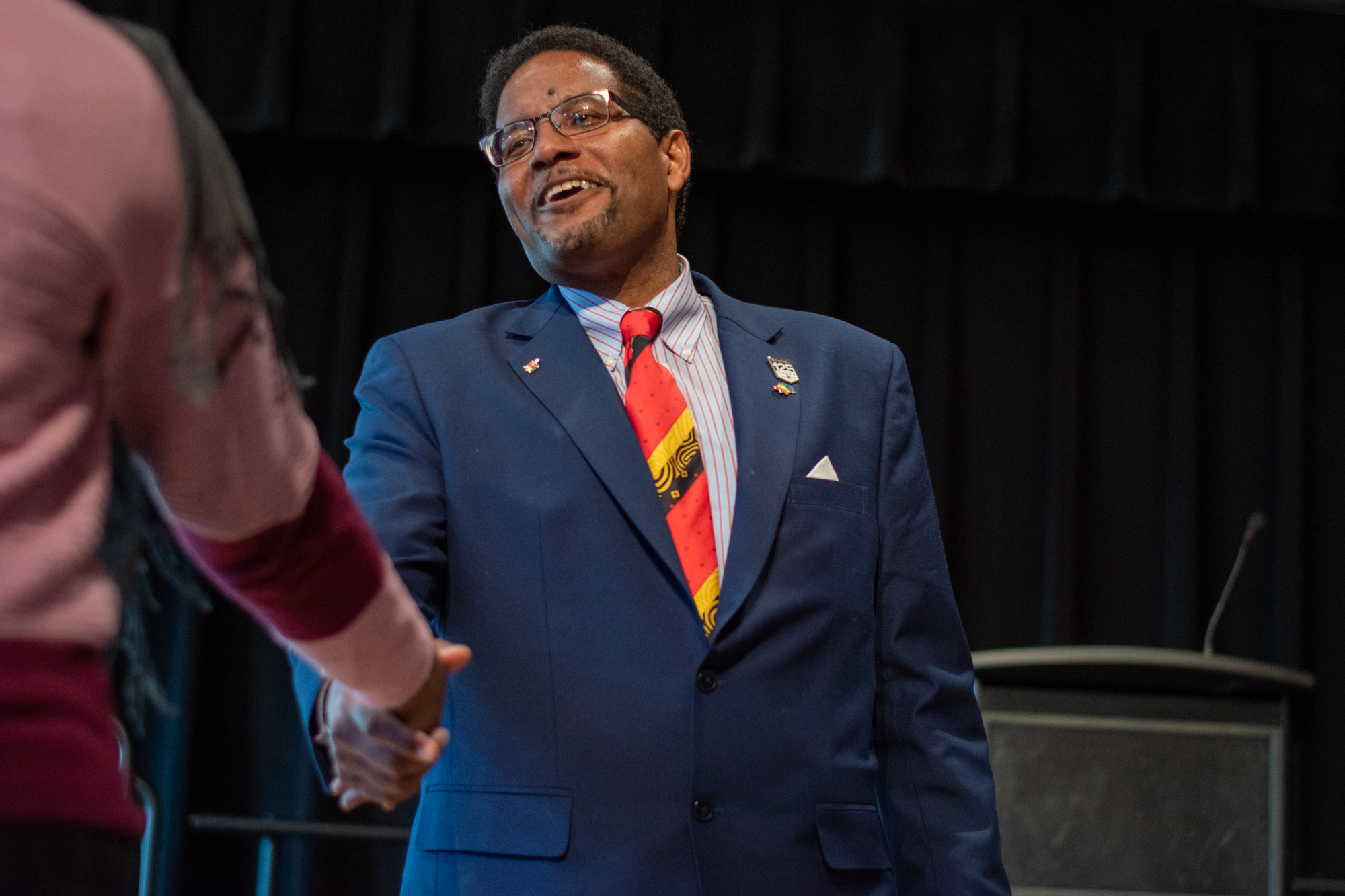Lyna Bentahar and Christine Condon
Staff writers
When University of Maryland engineering student Rachel Harvey heard that Darryll Pines, dean of the engineering school, would be the university’s next president, one memory in particular floated to the surface.
It was from her freshman year, when she’d participated in a research program for the university’s Center for Minorities in Science and Engineering. When the time came for the students in the program to present their research, Pines showed up.
“He came, he listened to all 14 of us talk about our research, he asked us questions,” the junior aerospace engineering major said. “And I think he’s going to bring that same energy to the entire school, so I’m very happy.”
Harvey isn’t alone. After Pines was announced as the university’s new president on Wednesday, students who’d interacted with him — especially leaders of groups meant to help minority students interested in engineering — described an attentive and supportive dean.
Favour Nerrise, a senior computer science major who got to know Pines through her work with the university’s Black Engineers Society, described him as motivating, personable — and fond of dad jokes.
He attended the group’s meetings, Nerrise said, and helped send members to conferences.
“Everyone’s really excited,” said Nerrise, who’s financial chairperson for Region II of the National Society for Black Engineers. “I am more than ecstatic, especially having known Dean Pines as Dean Pines and now as President Pines.”
David Boutin, corporate chair for the Society of Hispanic Professional Engineers and president of Theta Tau, a professional co-ed engineering fraternity, felt the same way.
[Read more: “An open door policy”: How Darryll Pines plans to rebuild trust as UMD’s next president]
As a freshman, Boutin took Pines’ engineering course, which aimed to expose students to a variety of engineering fields and the challenges they aim to tackle. It helped Boutin go from an undecided engineering student to an electrical engineering major.
“It was just incredible,” Boutin said. “He’s just so charismatic and also understanding, and has really been the force behind all the change that’s been going on over the last ten years or so in the Clark School.”
The $219 million donation from the Clark family, secured during Pines’ tenure as dean, is proof that a Pines administration will have good things in store for the university, Boutin added.
“If he was able to do that just for the Clark School,” he said, “then I can only imagine what’s going to happen as the president of the whole school.”
On Friday, what was planned to be a two-hour ice cream social event stretched on for an extra thirty minutes as dozens of faculty, staff and students waited in line to meet Pines.
By the end of it all, Pines estimated he’d shaken hundreds of hands, and said he felt humbled.
“My goal is to get a gauge of the pulse and state of the community,” he said.
Mazin Elhag, a senior information systems major, said he believed Pines could stabilize the administration after years of controversy.
During university President Wallace Loh’s tenure, a spate of racist incidents on campus preceded the murder of a black Bowie State University student, 2nd Lt. Richard Collins, who visited this university in 2017. Then came the death of black football player Jordan McNair, who suffered heatstroke at a team workout. Reports on the incident showed McNair didn’t receive adequate medical attention, and that a lack of administrative oversight over the football team allowed an abusive environment to fester. Shortly after this news came out, Loh announced his retirement.
[Read more: UMD’s next president outlines plan for transition team of students and staff]
The Pines administration may focus more on the voices of minority students, Elhag said.
“There’ll be more understanding of minority students that may have been overlooked in previous years,” Elhag said.
Many people highlighted heightened diversity within the engineering school under Pines’ leadership. Over the course of his tenure, the number of women undergraduates in the school increased from 18 to 26.5 percent, and the number of minority students jumped from 9.5 to 16 percent.
Aside from congratulations, Pines said he heard a number of people bring their concerns to the event. The low bandwidth of campus WiFi network eduroam, for example, was something he hadn’t known was a common grievance before the social. But as Pines hears from faculty, students and staff, he says he wants to know the good just as much as the bad.
“I don’t want us to have just a conversation about ‘what are all the problems,’ right? We should say, what are we doing that’s really good,” Pines said. “Let’s quantify that and compartmentalize that.”
All in all, Pines will begin his tenure with an optimistic engineering school behind him, Boutin said.
“You can’t find one person in the engineering school who has something bad to say about Dean Pines,” he said.
Staff writers Chloe Goldberg, Clara Longo de Freitas and Kanika Mehra contributed to this report.



